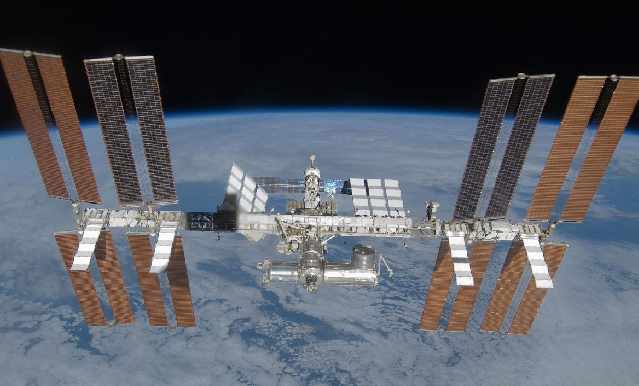Science
NASA Plans Fiery Deorbit of ISS by 2028 Amid 3I/ATLAS Updates

NASA has announced plans to decommission the International Space Station (ISS) by 2028, culminating in a controlled descent into the remote Point Nemo. This significant decision comes after over 25 years of continuous operation in low Earth orbit, marking the end of an era for one of humanity’s most ambitious collaborative space endeavors.
The ISS, a marvel of modern engineering, has served as a microgravity laboratory since its first module was launched in 1998. It has hosted astronauts and researchers from around the world, facilitating groundbreaking experiments in various scientific fields. With the station’s operational life nearing its conclusion, NASA is prioritizing a safe and responsible deorbiting process.
Transition to New Space Endeavors
As NASA prepares for the ISS’s demise, it is also pivoting towards the next chapter in human spaceflight. The agency is focusing on the **Artemis program**, which aims to return humans to the Moon and eventually send astronauts to Mars. The closure of the ISS will free up resources and attention for these ambitious missions.
NASA’s decision aligns with the upcoming **3I/ATLAS** project, which promises to enhance international collaboration in space exploration. The 3I initiative aims to streamline operations and safety protocols for future missions, ensuring that the transition from the ISS to newer platforms is seamless.
The ISS’s descent into Point Nemo, often referred to as the “spacecraft cemetery,” is a calculated move. This remote area in the South Pacific is chosen specifically to minimize risks to human life and property. By targeting this location, NASA aims to ensure that any debris from the station will fall harmlessly into the ocean.
Challenges Ahead
As the decommissioning process unfolds, several challenges remain. The financial implications of transitioning from the ISS to new ventures are significant. NASA officials have indicated that the estimated cost of decommissioning could reach **$1.2 billion**. This figure includes expenses related to the final missions that will return astronauts and cargo to Earth.
Moreover, the agency is working to secure partnerships with private companies to utilize the ISS for commercial purposes until its final days. Engaging the private sector is seen as a crucial step in maintaining the momentum of human presence in low Earth orbit.
NASA’s plans for the ISS’s end have prompted various reactions from the international community. While many acknowledge the necessity of the decommissioning, concerns about the long-term impact on scientific research persist. The ISS has been pivotal in advancing our understanding of space and its effects on the human body.
In summary, NASA’s decision to decommission the ISS by **2028** reflects a broader strategy to transition towards new frontiers in space exploration. The controlled descent into Point Nemo underscores the agency’s commitment to safety and responsibility as it embarks on this new journey. As the world watches, the future of human spaceflight is poised to take bold new steps, grounded in the lessons learned from the ISS era.
-

 World4 months ago
World4 months agoSBI Announces QIP Floor Price at ₹811.05 Per Share
-

 Lifestyle4 months ago
Lifestyle4 months agoCept Unveils ₹3.1 Crore Urban Mobility Plan for Sustainable Growth
-

 Science3 months ago
Science3 months agoNew Blood Group Discovered in South Indian Woman at Rotary Centre
-

 World4 months ago
World4 months agoTorrential Rains Cause Flash Flooding in New York and New Jersey
-

 Sports3 months ago
Sports3 months agoBroad Advocates for Bowling Change Ahead of Final Test Against India
-

 Top Stories4 months ago
Top Stories4 months agoKonkani Cultural Organisation to Host Pearl Jubilee in Abu Dhabi
-

 Science4 months ago
Science4 months agoNothing Headphone 1 Review: A Bold Contender in Audio Design
-

 Top Stories4 months ago
Top Stories4 months agoAir India Crash Investigation Highlights Boeing Fuel Switch Concerns
-

 Sports3 months ago
Sports3 months agoCristian Totti Retires at 19: Pressure of Fame Takes Toll
-

 Business4 months ago
Business4 months agoIndian Stock Market Rebounds: Sensex and Nifty Rise After Four-Day Decline
-

 Politics4 months ago
Politics4 months agoAbandoned Doberman Finds New Home After Journey to Prague
-

 Top Stories4 months ago
Top Stories4 months agoPatna Bank Manager Abhishek Varun Found Dead in Well









